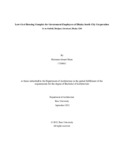Low-cost housing complex for government employees of Dhaka South City Corporation 14 no outfall, Dhalpur, Jatrabari, Dhaka 1204

View/
Date
2022-09Publisher
Brac UniversityAuthor
Muna, Maimuna AhmedMetadata
Show full item recordAbstract
Bangladesh is a thickly populated agricultural nation with one of the most reduced land-individual
proportions and a high land cost. Sadly, monetary limitations forestall low-pay individuals from having
the fundamental right of excellent and reasonable lodging, which brings about the rapid development of
ghettos without residency transport. Even though ghettos need: open utility offices, legitimate clean sterile
and waste offices, and available local area benefits, the low-pay inhabitants need to pay high leases for the
living region and high rates for unlawfully oversaw administrations. The Government of Bangladesh
(GoB) attempted a few housing complex programs throughout the country, in government khas lands, to
restore the nearby low-pay families, which sadly finished in disappointment. It is therefore hoped that
more innovative solutions will be found to more effectively manage the provision of adequate and fair
housing for low-wage workers. This essay aims to show how the harmonious coexistence of individuals
and caring environments can foster environments that are conducive to the health of those who live in
them, blending the masses of the landscape and the building to create a niche that constantly promotes
communication and activities that support people's psychological well-being so that they can learn to cope
with the norms of everyday life and mingle with people. It aims to provide a safe environment for families
and other communities.
The development of 14no Outfall, Jatrabari, happens because of quick urbanization. The rural populace
hopes to dispose of poverty by joining the informal metropolitan economy, where a large portion of
individuals are working under the Dhaka South City Corporation, and those individuals are cleaners,
partners, and sweepers. The public authority allotted this spot to a gathering of low-pay individuals
numerous prior years, and continuously this spot is casually developing. As expressed by UNICEF (2010,
November), by 2015, because of urbanization, the number of inhabitants in Bangladesh in metropolitan
regions is supposed to increment to roughly 50 million individuals.
